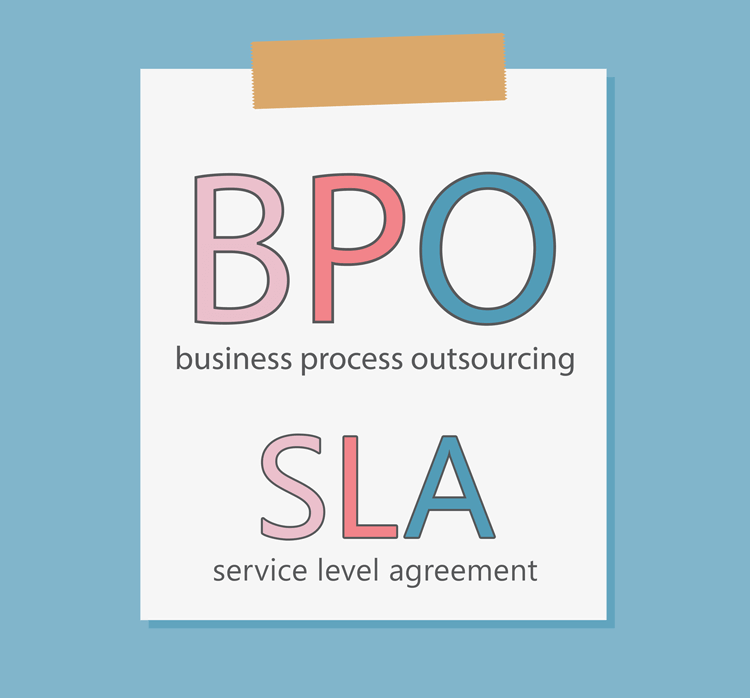Top 10 Disputes to Address in Your Business Process Outsourcing (BPO) SLA
What is BPO: Business Process Outsourcing?
BPO stands for Business Process Outsourcing and is the contracting of services to third-party companies that can provide them more inexpensively or better than your company. Businesses outsource their work for many reasons but are most commonly looking to decrease costs, expand capabilities or lessen risks. Some common outsourcing services include Customer Service/Call Center/Helpdesk, Client Management, Human Resources, and even Accounting. Third-party providers offer these solutions using cost-efficient approaches. This article will focus on Call Center providers, although many of the points can apply to other types of outsourced services as well.

A Business Process Outsourcing agreement establishes clear guidelines and defines roles in order to ensure smooth cooperation between both sides. It also gives an overview of the Business Process Outsourcing environment and its requirements so that you don't set yourself up for failure from day one.
What is a BPO Service Level Agreement (SLA)?
Service Level Agreements (SLA) are a critical part of Business Process Outsourcing. In fact, the SLA is one of the most important Business Process Outsourcing documents you will ever sign. It is the contract you sign with your third-party provider. The Business Process Outsourcing SLA sets the tone for your BPO experience and outlines all the Key Performance Indicators (KPIs) to measure the services' success.
The SLA includes:
- the client's and the BPO's responsibilities,
- scope of service,
- each stakeholder's duties,
- the budget for the services,
- the payment plans,
- timeline of services, and
- any mediation or penalties in situations of dispute.
For that reason, it's absolutely essential that a Service Level Agreement be heavily referenced during Business Process Outsourcing negotiations so that both parties are aware of what's expected and can provide input into this BPO tool.
10 Common BPO SLA Disputes to Address
Having an SLA does not guarantee that there will not be any disputes between the client and the BPO. Here are some common disputes that are faced during and should be addressed specifically beforehand in a BPO service level agreement:
-
BPO does not allocate enough budget to operation
In cases where very little budget is allocated to Business Process Outsourcing, there will likely be many complaints about the BPO team not having an adequate amount of time to perform its tasks, which can lead to services being handled in a haphazard fashion, resulting in poor services and wasted resources.
-
BPO has outdated technology
Businesses rely upon their technology partners to keep them in line with modern trends and techniques as well as give them access to new ideas and technologies they may not have considered. This means making sure those businesses have access to reliable networks and data storage systems, which are vital components in any operation.
-
BPO and client Business do not align on business priorities
Misaligned business priorities can affect the Business process in a way that negatively impacts both parties. Business Process Outsourcing is supposed to help the Business, but if they are not working together towards common goals, then there is very little Businesses can do other than complete the contract and hope for better results next time around.
-
BPO fails to train and hire agents who can expertly handle problems
When BPOs do not allocate enough budget and have high employee turnover, the quality of service can suffer terribly. When new agents are hired and not trained properly because BPOs do not want to reinvest in training, the agents will lack the skills needed to address your customers' problems. The result? Customers will only remember a negative experience with your company, not the BPOs.
-
Loss of Business data and remediations
A call center BPO is responsible for extensive call data and product knowledge management. With outdated technology or insecure data management, your BPO can lose data or become susceptible to security threats. If you have a contract that allows the BPOs to take your business offline until they remedy their issues, then this could be a major concern, since this kind of outage could hurt the business in worse ways than just lost revenue. It is therefore critical to be cautious with data security and threat management to keep your business safe from losses you may incur through downtime.
-
BPO does not meet KPIs
If a Business Process Outsourcing company fails to meet Key Performance Indicators (KPI), such as project deadlines, it could potentially harm the reputation of your company. In addition, keeping the BPO on task is important because you want them to reach necessary BPO KPI metrics milestones as efficiently as possible so that they succeed in the services they are providing you.
A BPO project may go over schedule, especially if there are several cross-department projects being conducted simultaneously or last-minute changes in the requirements of Business Process Outsourcing requests. If the BPO is taking up too much of your time and costing you money as well, it's important to establish a minimum KPIs in the Service Level Agreement so that there aren't delays in future projects.
-
Low first call resolution rate
A first call resolution rate is how many calls the Business Process Outsourcing provider handles correctly on the first attempt. BPO companies need to boost this rate by identifying issues early and coaching employees on how to solve them. When they fail to do so, the BPO increases unnecessary call time and decreases customer satisfaction. It is important for you to identify whether or not your outsourced call center has a good knowledge system to quickly resolve issues.
-
BPO has a strict call turnover rate that creates unsatisfied customers
The Golden 80/20 Rule is not so golden anymore. This service rule entails that 80% of calls incoming into the call center should be answered within 20 seconds. However, this adds pressure on the agent to resolve the customer's concerns as fast as possible or transfer to another department, which can create frustration for the customer. In the end, the customer spends hours being transferred between agents without a resolution, and this kind of service will reflect poorly on your company.
-
BPO has a high employee turnover rate
The biggest challenge facing Business Process Outsourcing providers today is staff retention and the availability of workers with the right training and experience. This results in uncertainty of whether or not the quality of service will decrease over time.
-
Agents failing to understand the Client's product or service
When agents do not properly understand your product or service, they fail to provide your customer the right information. This again results in caller dissatisfaction and may result in low customer retention.
Possible Solutions
However, not all is lost. There are ways to mitigate these situations beforehand:
- It's important to have negotiation terms in cases of a low success rate
- You should require routine reporting of calls handled by the BPO and their resolutions
- It's key to the client-BPO relationship for you to interact and collaborate with the call center team responsible for your services/products
- You must also require submission of a budget detailing to ensure you understand how the service fees will be spent
- Another critical decision you and BPO should collectively make is what the KPIs and call targets should be. This will ensure both parties understand the goals that need to be met.
Companies that outsource lose money when there is a problem with processes and require additional time to correct problems caused by Business Process Outsourcing. They can also face reputational damage from customers if the BPO is unable to deliver on time, resulting in customer churn or dissatisfaction and the incurring of extra expenses for companies hoping for everything to run smoothly without any glitches or hiccups because of outsourcing. The steps mentioned above are a great way to ensure unnecessary problems and disputes are avoided by all stakeholders.





